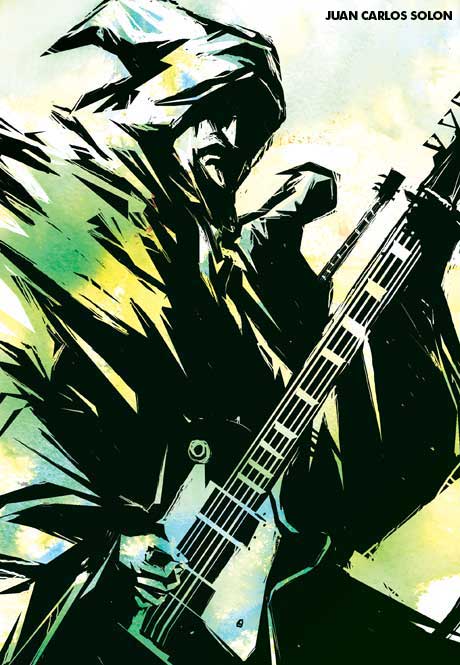In their 11 or so years of decimating ear drums and instilling patience into the metal community, the mighty Sunn O))) have been stalwart at preserving the purity of their colossal sound. The blackness of 2005's Black One was such a benchmark moment for Greg Anderson and Stephen O'Malley, but the duo and their ever-growing cast of collaborators have expanded their sights with Sunn O)))'s seventh studio album. Monoliths & Dimensions is as boundless as the title implies, still pushing the maxed out volume levels but with scope that expands far beyond the rumbling drones from their custom SUNN® amps. The 16-person, 17-minute-plus "Aghartha" opens at a snail's pace with Mayhem's Attila Csihar mumbling evils, but then descends into a black hole of damaged piano chords, bleeding strings, aching horns, moaning conch shells and water droplets. "Big Church" then demonizes a transcendent choir of angels and "Hunting & Gathering" uses brass and electronics to build a load-bearing wall. It's the sublime "Alice" that best demonstrates Sunn O)))'s appetite to explore more textures, subsiding the guitars for affecting strings and brass, it's perhaps their first time ever light has entered their ominous universe. Sunn O))) have introduced a whole new heaviness with Monoliths & Dimensions.
"Alice" is the most radical thing you've done. Where did that song come from?
Anderson: "Alice" was definitely a different step for us. With each record we try to make it somewhat different than the one that came before it, and sometimes they're very subtle differences and sometimes they're very major. I think with this album, it's not so subtle. "Alice," to me, is the highlight of the record and the pinnacle of what we've achieved so far musically. And I say that because it was really a challenge for us to create a piece of music that had a heaviness to it but also showed some light and some contrast to the darkness.
Does performing at such loud volumes ever take its toll on you?
I've been really against wearing earplugs. It's kind of like wearing condoms for your ears it's just not the same. But after extended exposure to the volume we're playing at, it gets damaging. It's a catch-22, because the point of playing live is to really have a physical presence, and the frequencies that we're playing at has a lot of subs and low ends, so it creates this physical vibration when you're in front of it. It's an important part of what we do, and the sacrifice that needs to be made is possible hearing loss [laughs]
(Southern Lord)"Alice" is the most radical thing you've done. Where did that song come from?
Anderson: "Alice" was definitely a different step for us. With each record we try to make it somewhat different than the one that came before it, and sometimes they're very subtle differences and sometimes they're very major. I think with this album, it's not so subtle. "Alice," to me, is the highlight of the record and the pinnacle of what we've achieved so far musically. And I say that because it was really a challenge for us to create a piece of music that had a heaviness to it but also showed some light and some contrast to the darkness.
Does performing at such loud volumes ever take its toll on you?
I've been really against wearing earplugs. It's kind of like wearing condoms for your ears it's just not the same. But after extended exposure to the volume we're playing at, it gets damaging. It's a catch-22, because the point of playing live is to really have a physical presence, and the frequencies that we're playing at has a lot of subs and low ends, so it creates this physical vibration when you're in front of it. It's an important part of what we do, and the sacrifice that needs to be made is possible hearing loss [laughs]
